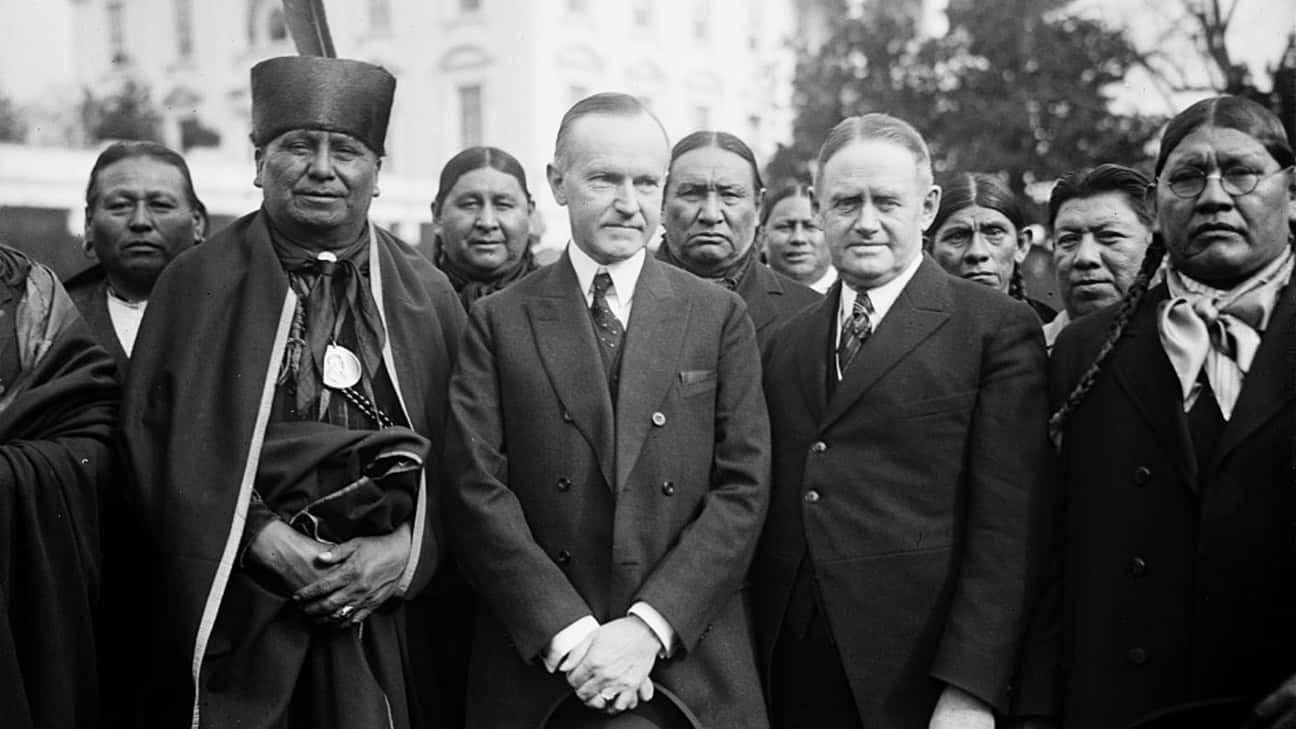
- Details
- By Levi Rickert
On June 2, 1924, the United States passed the Indian Citizenship Act (ICA). This historic milestone granted dual citizenship to members of federally recognized tribal nations and paved the way for additional protections for Native Americans across the country.
While the significance of the ICA is profound, some tribes including the Choctaw Nation of Oklahoma had already gained citizenship before the act’s passage due to previous treaties.
Iti Fabvssa, a monthly column in Choctaw Nation’s Biskinik newspaper, emphasizes that “while we share a lot of history and experiences with other American Indians (and the Five Tribes especially), Choctaws have a distinct history and relationship with the U.S. government.” The article explains, “Choctaws who took allotments were also granted U.S. citizenship in 1901 – before Oklahoma statehood and long before the 1924 Indian Citizenship Act, which gave the majority of American Indians citizenship.”
Despite the historical difference, CNO acknowledges the Indian Citizenship Act of 1924 was a crucial step forward. “The Indian Citizenship Act of 1924 provided important clarifications about the rights of members of federally recognized tribes, a critical part of defining sovereignty,” said Choctaw Nation Chief Gary Batton.
However, it would take many years until all rights, such as the right to vote, were bestowed upon the tribes. “After the Act, some states still didn’t allow Indians to vote until further legislation was passed in 1965. This history holds a lesson for today: we must constantly and vigilantly defend our rights as individuals and as sovereign nations. Part of my job as Chief of the Choctaw Nation is to protect those rights, and the members of our tribe play a critical role by engaging in their communities and voting in elections,” said Chief Batton.

More Stories Like This
Native News Weekly (August 25, 2024): D.C. BriefsUS Presidents in Their Own Words Concerning American Indians
Indigenous Actor Elaine Miles Reports Detention by Alleged ICE Agents
Happy Thanksgiving from Native News Online
Coming Up on Native Bidaské: Behind the Animation: Joey Clift Talks “Pow” and Native Storytelling
Help us tell the stories that could save Native languages and food traditions
At a critical moment for Indian Country, Native News Online is embarking on our most ambitious reporting project yet: "Cultivating Culture," a three-year investigation into two forces shaping Native community survival—food sovereignty and language revitalization.
The devastating impact of COVID-19 accelerated the loss of Native elders and with them, irreplaceable cultural knowledge. Yet across tribal communities, innovative leaders are fighting back, reclaiming traditional food systems and breathing new life into Native languages. These aren't just cultural preservation efforts—they're powerful pathways to community health, healing, and resilience.
Our dedicated reporting team will spend three years documenting these stories through on-the-ground reporting in 18 tribal communities, producing over 200 in-depth stories, 18 podcast episodes, and multimedia content that amplifies Indigenous voices. We'll show policymakers, funders, and allies how cultural restoration directly impacts physical and mental wellness while celebrating successful models of sovereignty and self-determination.
This isn't corporate media parachuting into Indian Country for a quick story. This is sustained, relationship-based journalism by Native reporters who understand these communities. It's "Warrior Journalism"—fearless reporting that serves the 5.5 million readers who depend on us for news that mainstream media often ignores.
We need your help right now. While we've secured partial funding, we're still $450,000 short of our three-year budget. Our immediate goal is $25,000 this month to keep this critical work moving forward—funding reporter salaries, travel to remote communities, photography, and the deep reporting these stories deserve.
Every dollar directly supports Indigenous journalists telling Indigenous stories. Whether it's $5 or $50, your contribution ensures these vital narratives of resilience, innovation, and hope don't disappear into silence.
 The stakes couldn't be higher. Native languages are being lost at an alarming rate. Food insecurity plagues many tribal communities. But solutions are emerging, and these stories need to be told.
The stakes couldn't be higher. Native languages are being lost at an alarming rate. Food insecurity plagues many tribal communities. But solutions are emerging, and these stories need to be told.
Support independent Native journalism. Fund the stories that matter.
Levi Rickert (Potawatomi), Editor & Publisher

